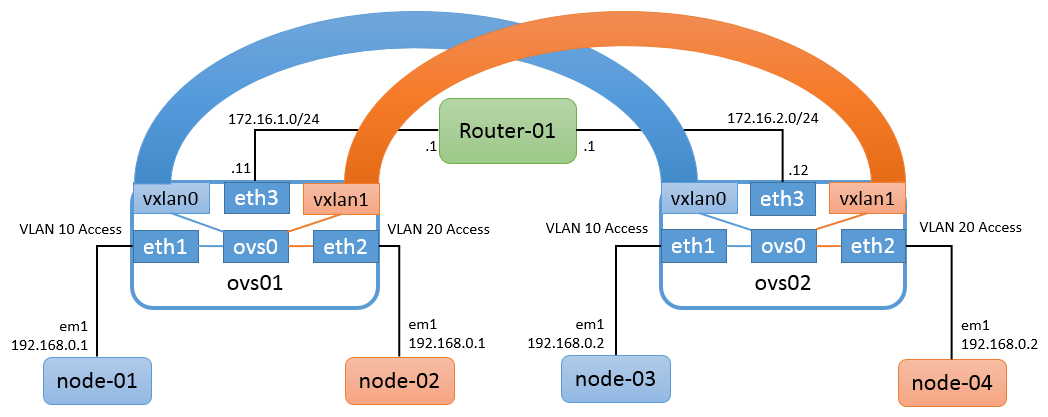VXLANネットワーク構築例 ユニキャスト編
Posted on 2014/03/18(Tue) 00:49 in technical
さまりー
openvswitch-2.0.0を使ってUnicast VXLANネットワークを構築する際のサンプルコンフィグレーション。
環境構成には、GNS3とVirtualBoxを使用します。
また、本記事は以前動かなかったなどと言っておきながら、動いたログを用意していなかったことに対する懺悔とも言えるものである。
Ubuntu-13.10とopenvswitch-1.10.2でVXLANが動かない件: https://www.ainoniwa.net/pelican/wp/1147
環境構成図
図のようなGNS3+VirtualBox環境をもとに、VXLANネットワークを作ります
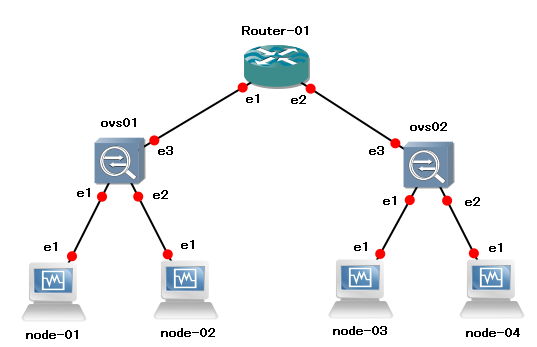
登場人物:
Router-01 : BSDRP 1.4 on VirtualBox node-01 : BSDRP 1.4 on VirtualBox node-02 : BSDRP 1.4 on VirtualBox node-03 : BSDRP 1.4 on VirtualBox node-04 : BSDRP 1.4 on VirtualBox ovs01 : Ubuntu-12.04.3 + openvswitch-2.0.0 on VirtualBox ovs02 : Ubuntu-12.04.3 + openvswitch-2.0.0 on VirtualBox
事前準備
openvswitch-2.0.0を入れておきましょう。
Configuration
router-01
ifconfig em1 172.16.1.1/24 up ifconfig em2 172.16.2.1/24 up
node-01
ifconfig em1 192.168.0.1/24 up
node-02
ifconfig em1 192.168.0.1/24 up
node-03
ifconfig em1 192.168.0.2/24 up
node-04
ifconfig em1 192.168.0.2/24 up
ovs01
面倒なのでrootで作業します。:
for i in `seq 0 5`; do ip link set up eth${i}; done
for br in `ovs-vsctl list-br`; do ovs-vsctl del-br ${br}; done
ovs-vsctl add-br ovs0
ovs-vsctl add-port ovs0 eth1 tag=10
ovs-vsctl add-port ovs0 eth2 tag=20
ovs-vsctl add-port ovs0 vxlan0 tag=10 -- set interface vxlan0 type=vxlan options:key=10 options:remote_ip=172.16.2.12
ovs-vsctl add-port ovs0 vxlan1 tag=20 -- set interface vxlan1 type=vxlan options:key=20 options:remote_ip=172.16.2.12
ip addr flush dev eth3
ip addr add 172.16.1.11/24 dev eth3
ip route add 172.16.2.0/24 via 172.16.1.1
ovs02
for i in `seq 0 5`; do ip link set up eth${i}; done
for br in `ovs-vsctl list-br`; do ovs-vsctl del-br ${br}; done
ovs-vsctl add-br ovs0
ovs-vsctl add-port ovs0 eth1 tag=10
ovs-vsctl add-port ovs0 eth2 tag=20
ovs-vsctl add-port ovs0 vxlan0 tag=10 -- set interface vxlan0 type=vxlan options:key=10 options:remote_ip=172.16.1.11
ovs-vsctl add-port ovs0 vxlan1 tag=20 -- set interface vxlan1 type=vxlan options:key=20 options:remote_ip=172.16.1.11
ip addr flush dev eth3
ip addr add 172.16.2.12/24 dev eth3
ip route add 172.16.1.0/24 via 172.16.2.1
設定確認
ovs01
# ovs-vsctl show
91158e4f-1bd0-4f50-b6c9-32f669ee0dee
Bridge "ovs0"
Port "vxlan0"
tag: 10
Interface "vxlan0"
type: vxlan
options: {key="10", remote_ip="172.16.2.12"}
Port "ovs0"
Interface "ovs0"
type: internal
Port "eth1"
tag: 10
Interface "eth1"
Port "vxlan1"
tag: 20
Interface "vxlan1"
type: vxlan
options: {key="20", remote_ip="172.16.2.12"}
Port "eth2"
tag: 20
Interface "eth2"
ovs_version: "2.0.0"
# ovs-vsctl list interface vxlan0 | grep -v -e "\[\]" -e "\{\}"
_uuid : f7220f60-98b0-4415-ba9c-8853ae490b89
admin_state : up
ifindex : 0
ingress_policing_burst: 0
ingress_policing_rate: 0
link_resets : 0
link_state : up
mac_in_use : "4e:89:6e:79:ae:d0"
name : "vxlan0"
ofport : 3
options : {key="10", remote_ip="172.16.2.12"}
statistics : {collisions=0, rx_bytes=0, rx_crc_err=0, rx_dropped=0, rx_errors=0, rx_frame_err=0, rx_over_err=0, rx_packets=0, tx_bytes=0, tx_dropped=0, tx_errors=0, tx_packets=0}
status : {tunnel_egress_iface="eth1", tunnel_egress_iface_carrier=up}
type : vxlan
# ovs-vsctl list interface vxlan1 | grep -v -e "\[\]" -e "\{\}"
_uuid : 9d44cad4-afbe-4c75-9560-f4491bc50fb6
admin_state : up
ifindex : 0
ingress_policing_burst: 0
ingress_policing_rate: 0
link_resets : 0
link_state : up
mac_in_use : "4e:80:02:bf:c8:ae"
name : "vxlan1"
ofport : 4
options : {key="20", remote_ip="172.16.2.12"}
statistics : {collisions=0, rx_bytes=0, rx_crc_err=0, rx_dropped=0, rx_errors=0, rx_frame_err=0, rx_over_err=0, rx_packets=0, tx_bytes=0, tx_dropped=0, tx_errors=0, tx_packets=0}
status : {tunnel_egress_iface="eth1", tunnel_egress_iface_carrier=up}
type : vxlan
ovs02
# ovs-vsctl show
91158e4f-1bd0-4f50-b6c9-32f669ee0dee
Bridge "ovs0"
Port "ovs0"
Interface "ovs0"
type: internal
Port "eth2"
tag: 20
Interface "eth2"
Port "eth1"
tag: 10
Interface "eth1"
Port "vxlan1"
tag: 20
Interface "vxlan1"
type: vxlan
options: {key="20", remote_ip="172.16.1.11"}
Port "vxlan0"
tag: 10
Interface "vxlan0"
type: vxlan
options: {key="10", remote_ip="172.16.1.11"}
ovs_version: "2.0.0"
# ovs-vsctl list interface vxlan0 | grep -v -e "\[\]" -e "\{\}"
_uuid : 12f8d480-391b-4caa-b33c-21c8efa09652
admin_state : up
ifindex : 0
ingress_policing_burst: 0
ingress_policing_rate: 0
link_resets : 0
link_state : up
mac_in_use : "06:b5:dc:96:19:f2"
name : "vxlan0"
ofport : 3
options : {key="10", remote_ip="172.16.1.11"}
statistics : {collisions=0, rx_bytes=0, rx_crc_err=0, rx_dropped=0, rx_errors=0, rx_frame_err=0, rx_over_err=0, rx_packets=0, tx_bytes=0, tx_dropped=0, tx_errors=0, tx_packets=0}
status : {tunnel_egress_iface="eth1", tunnel_egress_iface_carrier=up}
type : vxlan
# ovs-vsctl list interface vxlan1 | grep -v -e "\[\]" -e "\{\}"
_uuid : 0707adc6-7a57-4f5b-927c-b03070a2278a
admin_state : up
ifindex : 0
ingress_policing_burst: 0
ingress_policing_rate: 0
link_resets : 0
link_state : up
mac_in_use : "fe:36:34:fc:a9:fa"
name : "vxlan1"
ofport : 4
options : {key="20", remote_ip="172.16.1.11"}
statistics : {collisions=0, rx_bytes=0, rx_crc_err=0, rx_dropped=0, rx_errors=0, rx_frame_err=0, rx_over_err=0, rx_packets=0, tx_bytes=0, tx_dropped=0, tx_errors=0, tx_packets=0}
status : {tunnel_egress_iface="eth1", tunnel_egress_iface_carrier=up}
type : vxlan
動作確認
router-01
# tcpdump -i em1 -s 65535 -w /tmp/unicast-vxlan_router-01_em1.pcap
node-01
# ping -c 20 192.168.0.2 PING 192.168.0.2 (192.168.0.2): 56 data bytes 64 bytes from 192.168.0.2: icmp_seq=0 ttl=64 time=8.729 ms 64 bytes from 192.168.0.2: icmp_seq=1 ttl=64 time=2.460 ms 64 bytes from 192.168.0.2: icmp_seq=2 ttl=64 time=2.499 ms 64 bytes from 192.168.0.2: icmp_seq=3 ttl=64 time=2.303 ms 64 bytes from 192.168.0.2: icmp_seq=4 ttl=64 time=2.325 ms 64 bytes from 192.168.0.2: icmp_seq=5 ttl=64 time=2.109 ms 64 bytes from 192.168.0.2: icmp_seq=6 ttl=64 time=2.893 ms 64 bytes from 192.168.0.2: icmp_seq=7 ttl=64 time=2.486 ms 64 bytes from 192.168.0.2: icmp_seq=8 ttl=64 time=2.745 ms 64 bytes from 192.168.0.2: icmp_seq=9 ttl=64 time=1.737 ms 64 bytes from 192.168.0.2: icmp_seq=10 ttl=64 time=2.392 ms 64 bytes from 192.168.0.2: icmp_seq=11 ttl=64 time=2.690 ms 64 bytes from 192.168.0.2: icmp_seq=12 ttl=64 time=2.410 ms 64 bytes from 192.168.0.2: icmp_seq=13 ttl=64 time=2.981 ms 64 bytes from 192.168.0.2: icmp_seq=14 ttl=64 time=2.719 ms 64 bytes from 192.168.0.2: icmp_seq=15 ttl=64 time=2.741 ms 64 bytes from 192.168.0.2: icmp_seq=16 ttl=64 time=2.240 ms 64 bytes from 192.168.0.2: icmp_seq=17 ttl=64 time=2.703 ms 64 bytes from 192.168.0.2: icmp_seq=18 ttl=64 time=2.480 ms 64 bytes from 192.168.0.2: icmp_seq=19 ttl=64 time=2.440 ms --- 192.168.0.2 ping statistics --- 20 packets transmitted, 20 packets received, 0.0% packet loss round-trip min/avg/max/stddev = 1.737/2.804/8.729/1.387 ms
node-02
# ping -c 20 192.168.0.2 PING 192.168.0.2 (192.168.0.2): 56 data bytes 64 bytes from 192.168.0.2: icmp_seq=0 ttl=64 time=10.580 ms 64 bytes from 192.168.0.2: icmp_seq=1 ttl=64 time=1.911 ms 64 bytes from 192.168.0.2: icmp_seq=2 ttl=64 time=2.317 ms 64 bytes from 192.168.0.2: icmp_seq=3 ttl=64 time=2.543 ms 64 bytes from 192.168.0.2: icmp_seq=4 ttl=64 time=2.093 ms 64 bytes from 192.168.0.2: icmp_seq=5 ttl=64 time=2.368 ms 64 bytes from 192.168.0.2: icmp_seq=6 ttl=64 time=2.502 ms 64 bytes from 192.168.0.2: icmp_seq=7 ttl=64 time=2.370 ms 64 bytes from 192.168.0.2: icmp_seq=8 ttl=64 time=2.652 ms 64 bytes from 192.168.0.2: icmp_seq=9 ttl=64 time=2.184 ms 64 bytes from 192.168.0.2: icmp_seq=10 ttl=64 time=2.200 ms 64 bytes from 192.168.0.2: icmp_seq=11 ttl=64 time=2.544 ms 64 bytes from 192.168.0.2: icmp_seq=12 ttl=64 time=3.041 ms 64 bytes from 192.168.0.2: icmp_seq=13 ttl=64 time=2.397 ms 64 bytes from 192.168.0.2: icmp_seq=14 ttl=64 time=2.488 ms 64 bytes from 192.168.0.2: icmp_seq=15 ttl=64 time=2.443 ms 64 bytes from 192.168.0.2: icmp_seq=16 ttl=64 time=2.059 ms 64 bytes from 192.168.0.2: icmp_seq=17 ttl=64 time=2.320 ms 64 bytes from 192.168.0.2: icmp_seq=18 ttl=64 time=2.154 ms 64 bytes from 192.168.0.2: icmp_seq=19 ttl=64 time=1.926 ms --- 192.168.0.2 ping statistics --- 20 packets transmitted, 20 packets received, 0.0% packet loss round-trip min/avg/max/stddev = 1.911/2.755/10.580/1.813 ms
結果確認
wireshark氏にお任せする。
こんな感じでデコードします。
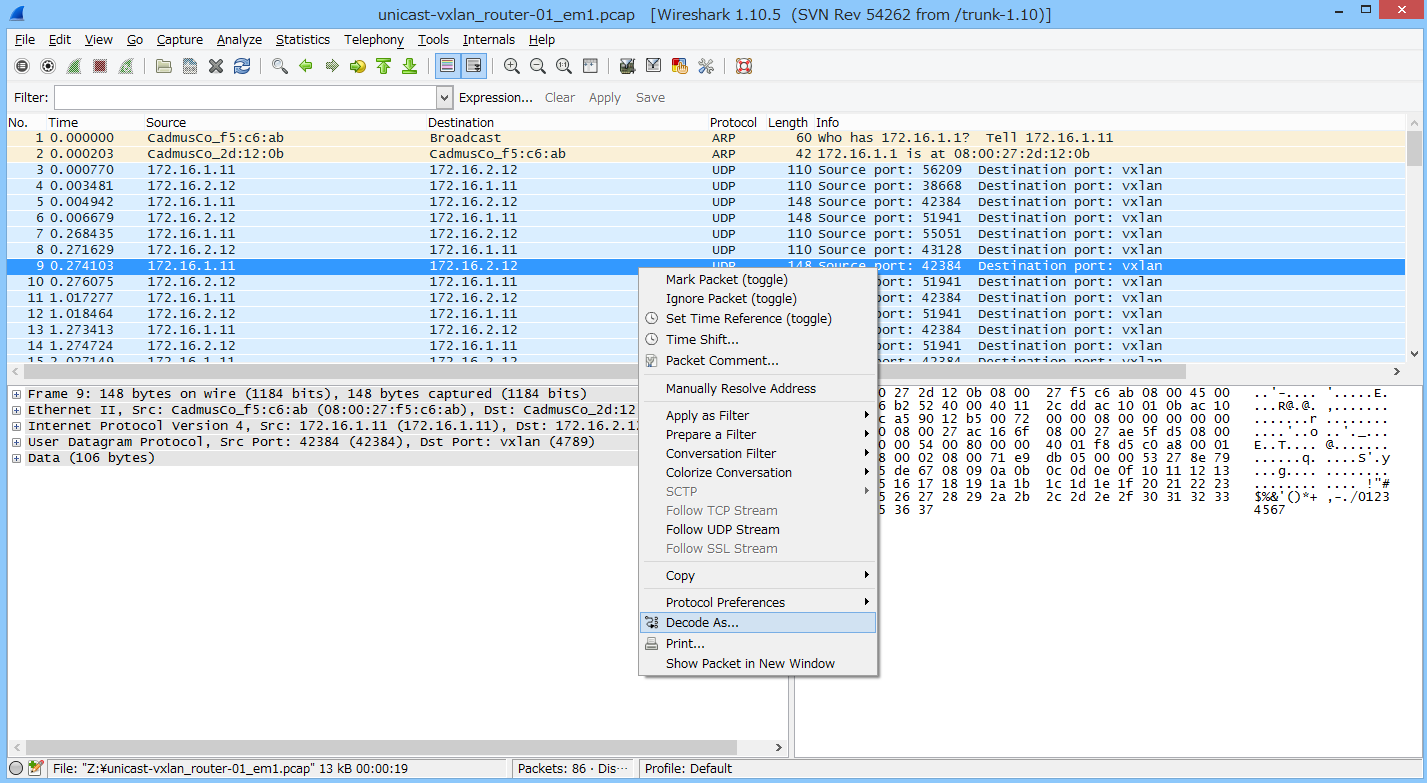
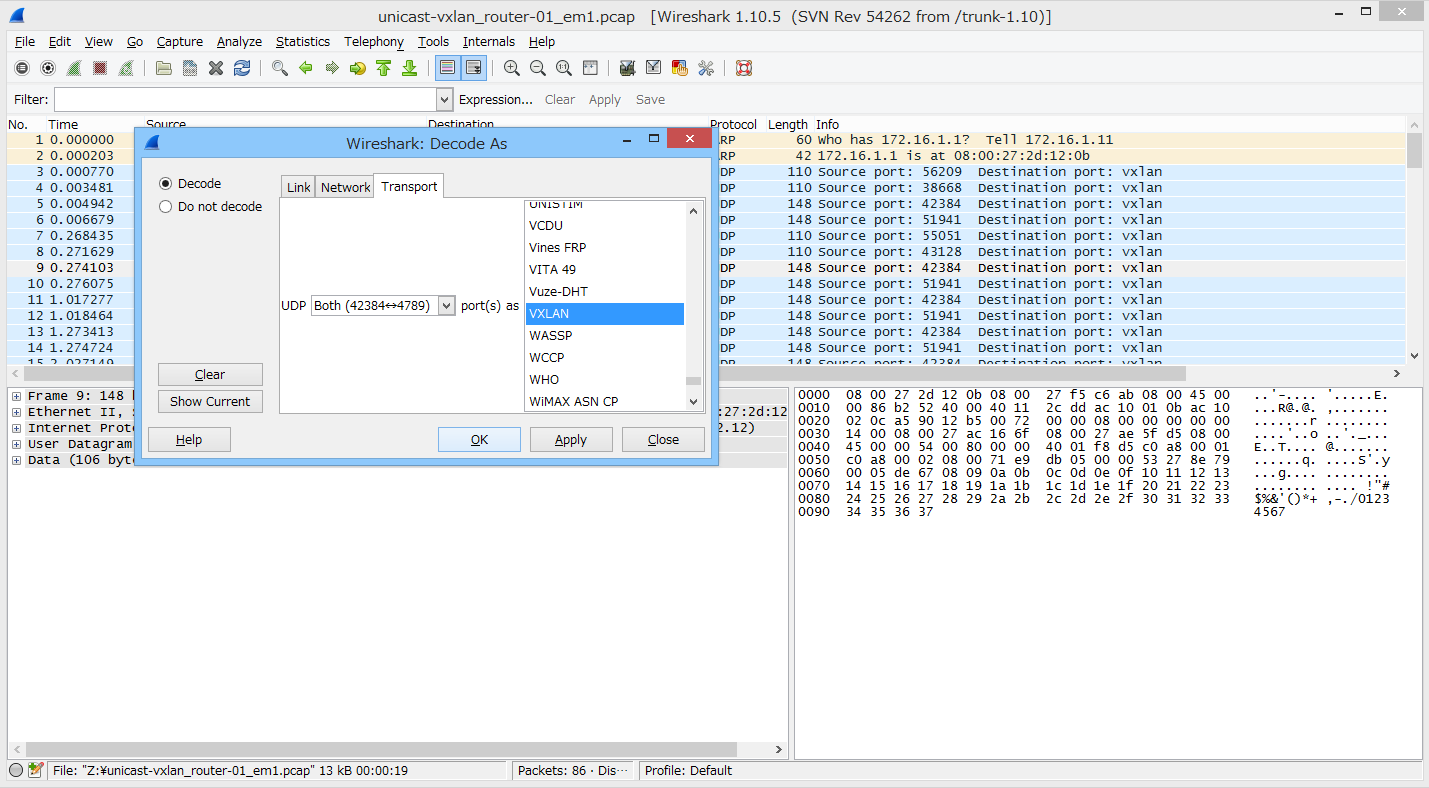
VNI=10の 192.168.0.1 <-> 192.168.0.2
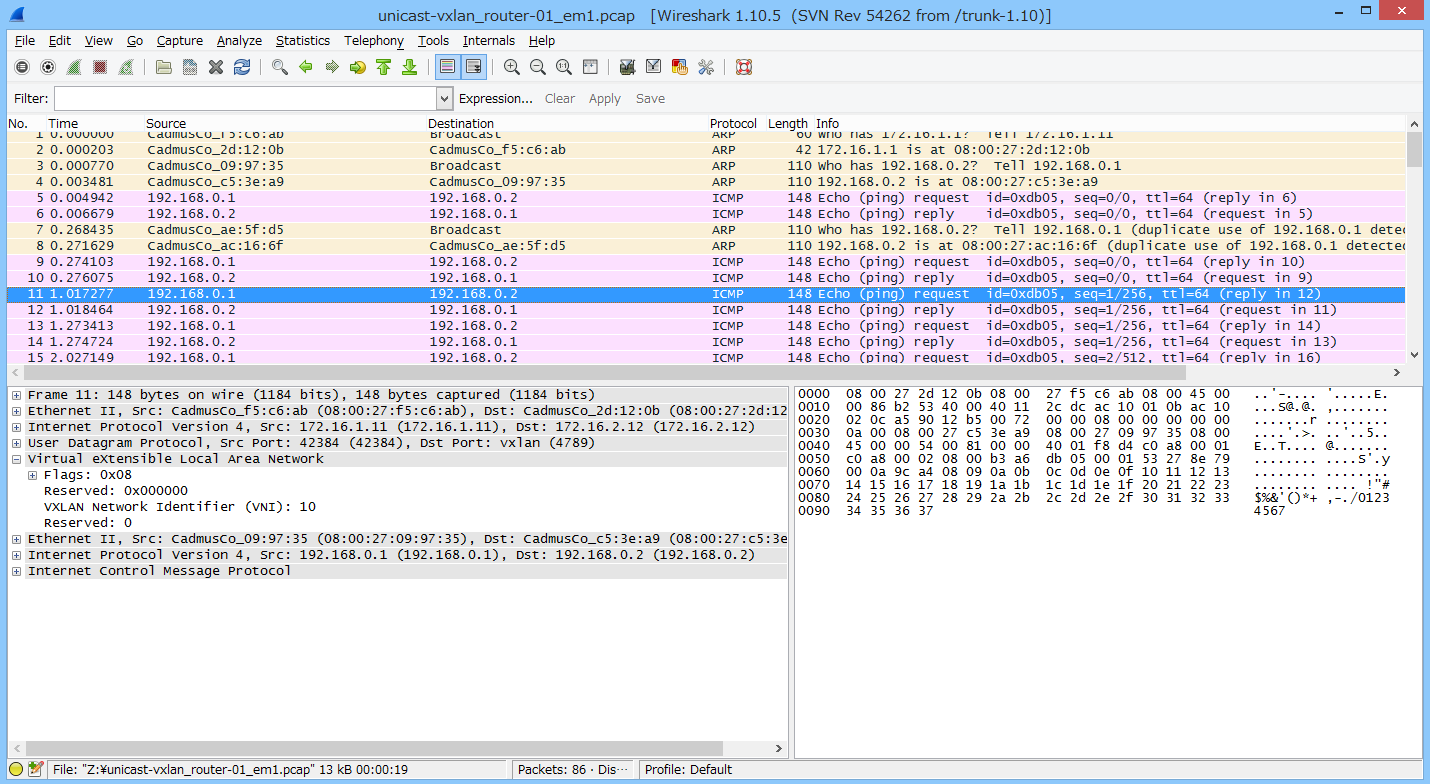
VNI=20の 192.168.0.1 <-> 192.168.0.2
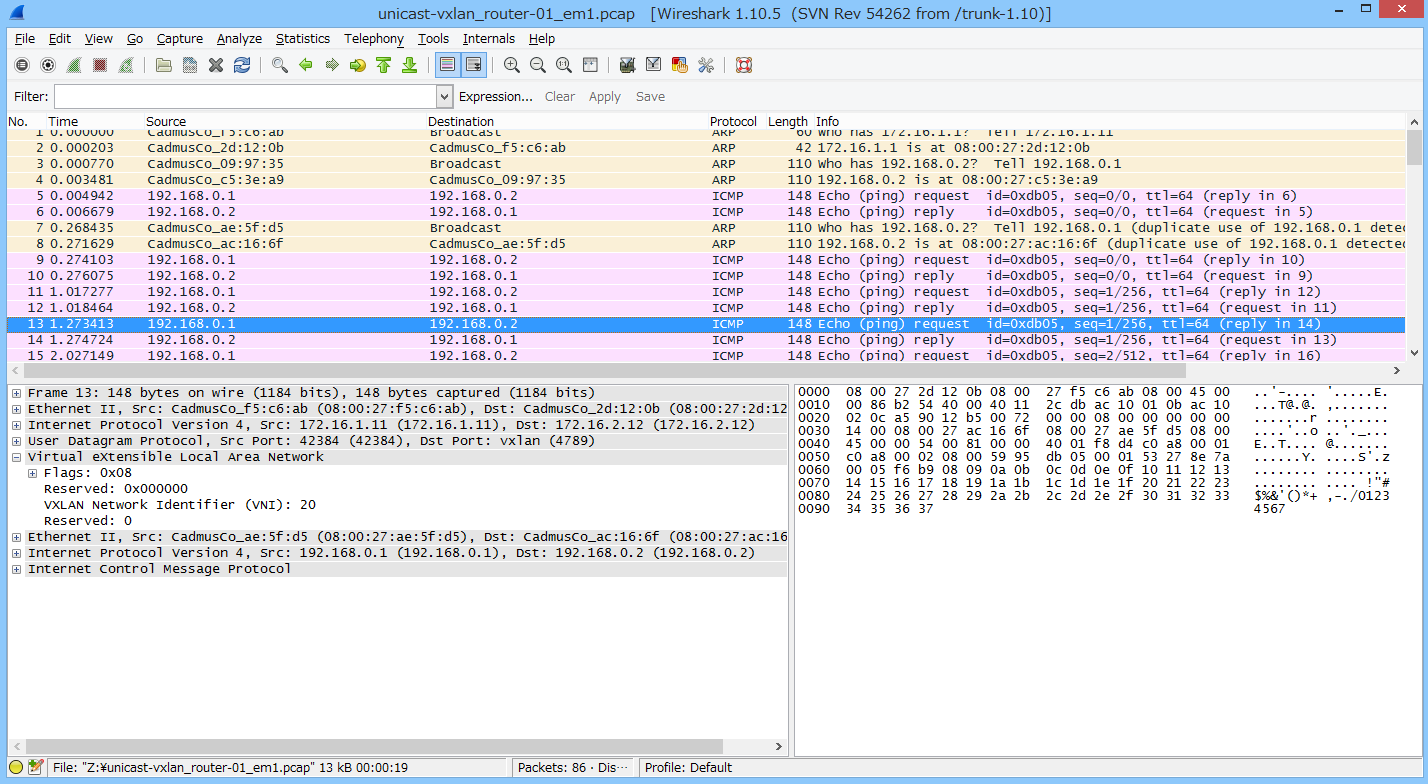
はい、うまいことIsolationされました。
マジでただのL2 over L3トンネル動かしましたってだけやで。
ちなみに、今回取得したpcapファイルはこちらです。 : https://www.ainoniwa.net/data/pcap/unicast-vxlan_router-01_em1.pcap
